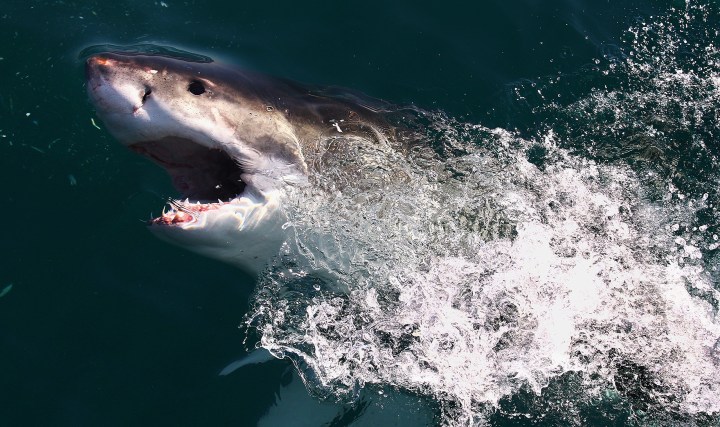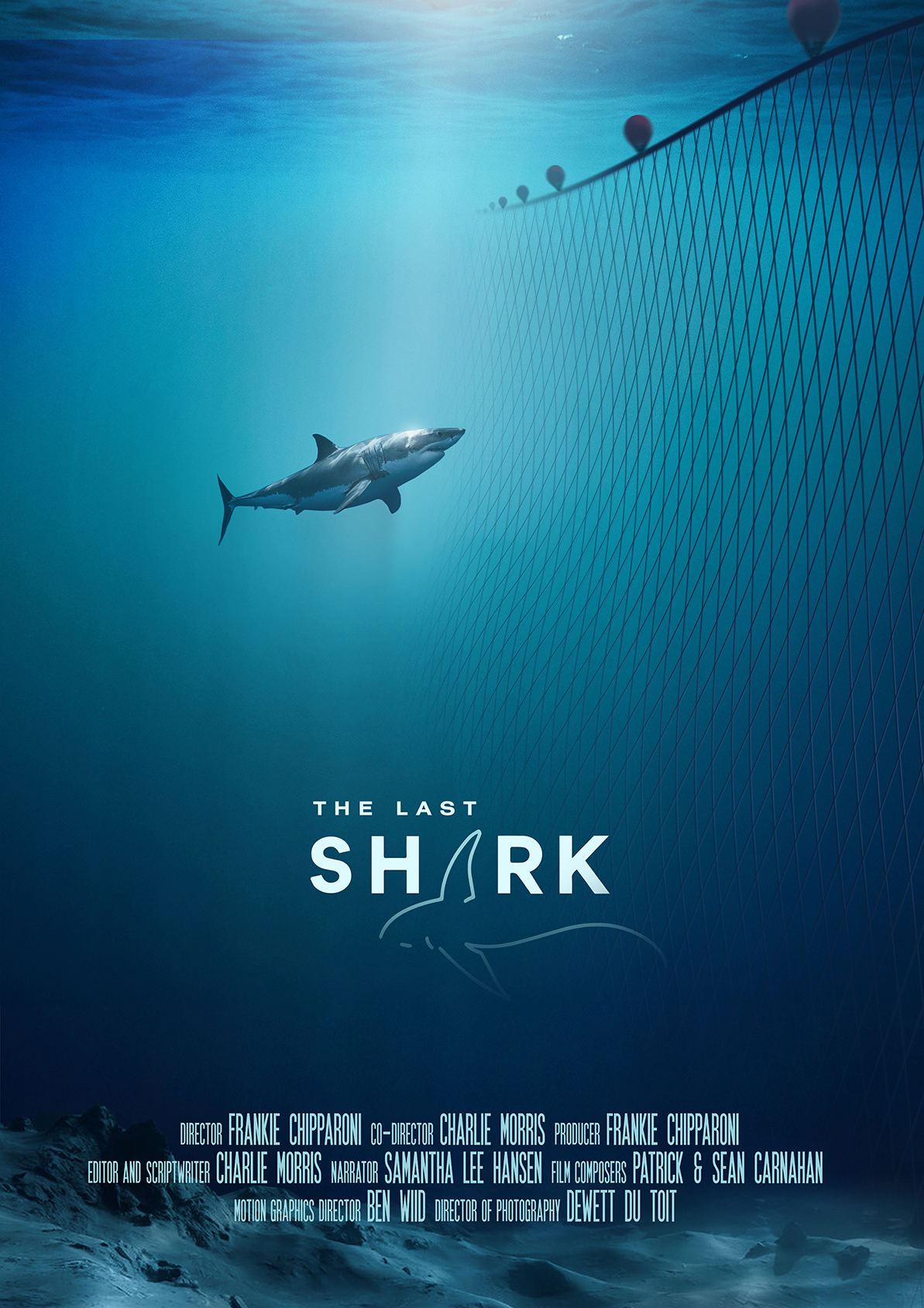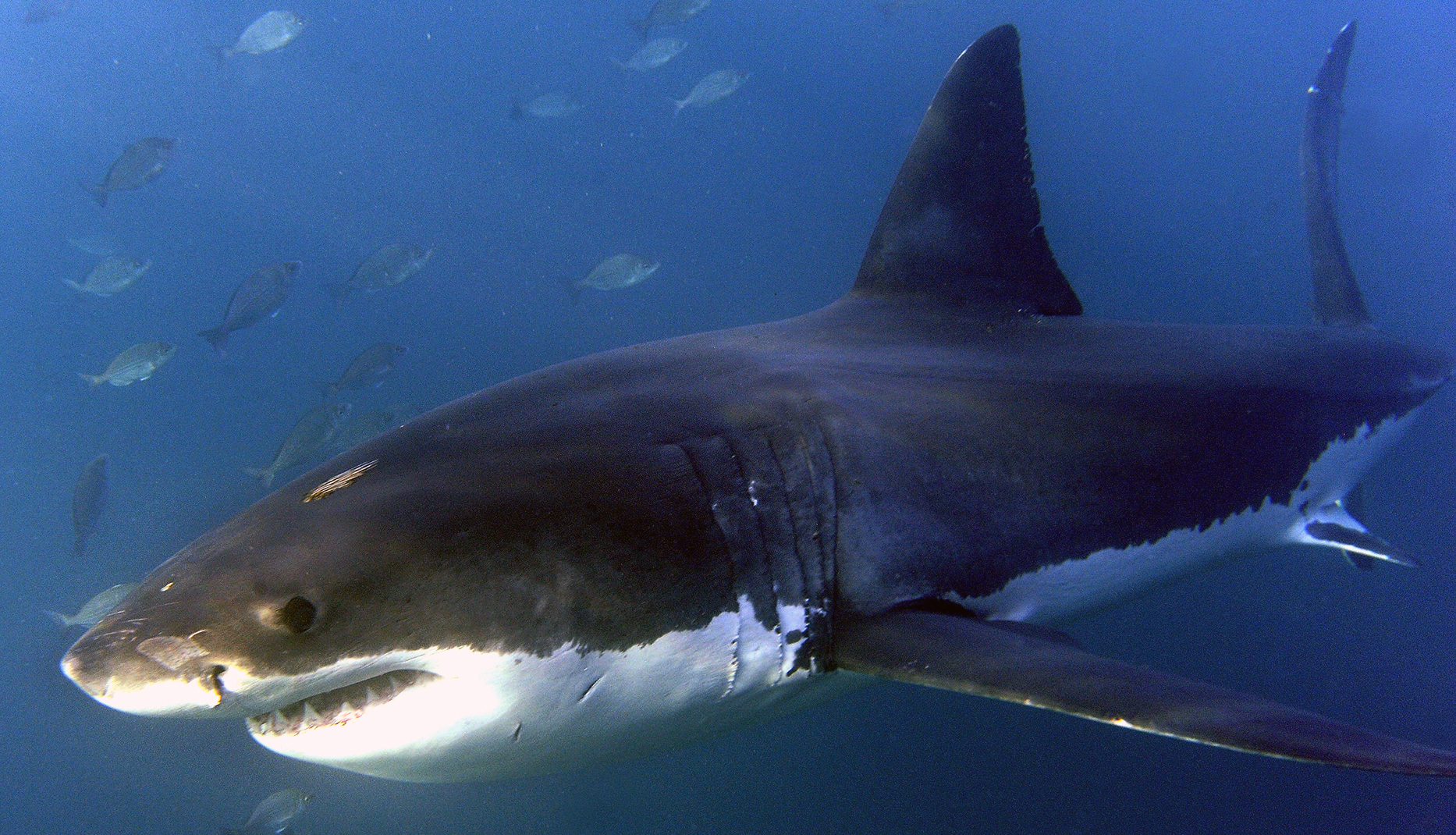SHARK TALES
The Last Shark — documentary starkly illustrates decline of great whites in SA waters

After watching falling numbers of sharks and the disappearance of great white sharks in Gansbaai in real-time, researchers, divers and other ocean users this week began screening their volunteer documentary, ‘The Last Shark’, to raise awareness about human-induced threats faced by shark species in South Africa.
The documentary brings awareness about the disappearance of great white sharks from South Africa’s coast and the harm caused by the current shark nets used by the KwaZulu-Natal Sharks Board (KZNSB), to communities with free screenings at various locations in the Western Cape, Eastern Cape and KZN over the coming months.
In an interview with Daily Maverick, director and producer Frankie Chipparoni — a marine behavioural scientist — explains that their intention is to change people’s perceptions, especially among youth and coastal communities, of sharks and to shed light on their rapidly declining population in hopes of fostering a deeper understanding of the delicate balance between marine ecosystems and human activities.
The ultimate goal of the documentary is to advocate for a shift in government policies. Chipparoni said, “We are pushing for the replacement of shark culling nets with alternative technologies that can safeguard both sharks and humans”.
Every year, these nets kill at least 20 to 30 highly endangered great white sharks as part of at least 400 sharks caught by them annually. Hundreds of other species are killed as well. It’s incredible that, despite being the first country to provide them with legal protection in 1991, this persists.
The reason for the disappearance of great whites has been linked largely to Orca predation (particularly that of Orca’s Port and Starboard in Gansbaai), decimation of their food source, a shift in their distribution, and that they have been killed by the KZNSB nets and baited drum lines. Shark finning is another factor leading to the decline in numbers.
Chipparoni and other experts in the documentary believe that the harm caused to sharks by the KwaZulu-Natal Sharks Board’s (KZNSB) nets and baited drum lines have more of a role in this disappearance as when the shark’s migrate from Gansbaai (as a result of Orca predation) towards the KZN coast, they get caught and killed by the KZNSB nets and baited drum lines.
“Considering the global great white shark population hovers between 3,000 — 5,000, it is a pressing issue, and the time for action is now,” Chipparoni said.

The Last Shark documentary, a passion project by researchers and ocean-users, premiered with free screenings along the coast this week about an investigation into the disappearance of the iconic great white sharks from South Africa’s coast and the impact of government’s use of shark nets. (Image: Supplied)
Bringing shark awareness to communities and changing perceptions of sharks
The movie is a call for a perception change of sharks and to connect humans back to the fact that sharks can’t view them as something that can just be killed because they might be a danger: “We need to realise that without them, there is no us. We need to create coexistence before we cause co-extinction,” she said.
South African wildlife conservationist De Wet Du Toit, was the original spearhead and director of the documentary before he left to pursue another conservation venture. It all got started in 2021 as Du Toit prepared to swim 7.7km to and from Dyer Island in Gansbaai (his home) to raise awareness of the diminishing numbers of great white sharks.
In an interview with the Daily Maverick, Du Toit said, “When I was getting in the mindset to get ready for the swim, it was terrifying because I grew up seeing this water teeming with sharks and during my preparation, I only saw one great white shark breach about 2m out of the water. Then I wondered if that was the last great white shark I would see here.”
Du Toit said this got him thinking that there may come a time in this lifetime when people won’t even know that they have seen the last shark and that future generations may not get to witness great whites in these waters — this is where the name of the documentary comes from.
Chipparoni added that the reason they are pushing for the free screenings of the documentary, even though the documentary has no budget, was because of the inequality within South Africa and the need for all to become educated and aware of these matters through freely available access.
One of the screenings this week took place at Sentinel Ocean Alliance (SOA), an NGO in Hout Bay, Cape Town creating ocean-based opportunities and providing ocean education for at-risk youth of South Africa’s coastal communities.
SOA managing director Marguerite Hofmeyr explains that the documentary’s message of changing people’s perceptions of sharks, especially among the younger generation, was crucial for several reasons.
Firstly, sharks play a vital role in maintaining the health of marine ecosystems. Misconceptions about sharks can lead to fear and unnecessary harm to these species.
Additionally, educating youth about the importance of sharks contributes to fostering a sense of environmental stewardship, encouraging responsible practices in coastal communities, and ensuring a sustainable coexistence between humans and marine life.
“SOA supports the call for the KZNSB to transform their technology away from shark nets and drumlines. We believe in the implementation of methods that prioritise the safety of both humans and sharks while minimising the impact on other marine species,” she said.
There was not a dry eye at the last screening in the south of Cape Town in Diep River, when anonymous footage was shown in the documentary of a baby tiger shark seen in severe distress and bleeding after it’s gills were trapped in a drumline near Umkomaas, a small coastal village along the south coast of KZN. An ocean user attempted to release the baby tiger from the drumline but was unsuccessful.
This is just one case of the harm shark nets and drumlines cause sharks and other marine life along the KZN coast where the KSNSB currently has 13.5 km length of shark nets deployed at 37 beaches between Richards Bay and Port Edward.
KZN shark nets do more harm than good
The Last Shark calls for transformation of the KZNSB, to change their historic shark net technology and begin using methods that protect both humans and sharks alike as the KwaZulu-Natal shark nets — initially installed for swimmer protection — are responsible for culling over 400 sharks annually.
Chipparoni said it was not their intention to call for an end to the KZNSB as it was a vital source of employment and provided numerous tourism opportunities, but that their shark net and drumline technology was causing more harm than good at the moment and there were alternative technologies that could be implemented to ensure bather safety.
Dr Matt Dicken, head of research and monitoring at the KwaZulu-Natal Sharks Board and an adjunct professor at the Institute for Coastal and Marine Research (CMR) at Nelson Mandela University, confirmed that in 2022, the KZNSB caught a total of 421 sharks and 156 harmless animals (these include fish, and other non-shark species), but noted that all animals found alive were released, “so the total number of animals killed is much less”.
He added that the number of animals caught by the KZNSB per annum would equate to around 0.005 per km per day between Richards Bay and Port Edward (about 310 km), and that these were far fewer animals than out of all commercial and recreational fisheries in SA.

A great white shark (Carcharodon carcharias) in the Indian Ocean, Gansbaai, Cape Town. (Photo: EPA / Helmut Fohringer)
He maintained that in KZN, the introduction of bather protection gear reduced the incidence of unprovoked shark attacks at protected beaches by 100%, which is in marked contrast to shark attacks in both the Eastern and Western Capes which have continued to increase every decade.
“We continue to look at solutions to reduce captures. Indeed, we have spent millions in developing an electrical barrier device which we hope will provide a global non-lethal alternative to nets/drumlines in reducing shark attacks in the future,
“Staff (including myself) sit on various shark attack committees internationally. We are fully aware of all alternate options to nets/drums currently on the market. None of these has a proven track record anywhere in the world and many would not even be possible in KZNSB due to the high energy cost and species of shark considered dangerous,” Dickson said.
Dr Enrico Gennari, marine ecologist specialising in great white sharks, from Oceans Research, was featured in the documentary and previously told the Daily Maverick, that white sharks in SA have been slowly declining over the past 20 years, and have declined even more after orcas started killing white sharks in False Bay in 2017.
Gennari also released a study indicating that the annual numbers of shark removals from nets were too high and pushed the great white shark toward a slow decline — and then, when orcas started killing more white sharks, “it was almost like a tipping point”.
The Department of Forestry, Fisheries and the Environment (DFFE) has been working closely with the KZNSB for a number of years, and on this particular matter, there has been an agreement that no new net installations will be considered.
The DFFE acknowledged that the catches in these installations were significant when viewed in the context of shark fisheries and shark bycatch, but that the KZNSB catches are still lower. However, they are continually looking at alternative technologies that have a reduced ecological impact.
Since 1978, the changes implemented by the KZNSB resulted in a 51% reduction in the total number of animals caught. This comprises a 63% reduction in sharks caught and a 71% reduction in harmless animals caught.
Dickson adds, “Since 2019, we have strategically removed nets at almost all beaches to mitigate any sardine run, or whale migration captures during the winter. We continue to strategically remove nets and replace them with drumlines to mitigate captures.”
DFFE spokesperson Peter Mbelengwa said, “We, in collaboration with the Sharks Board and several academic institutions, foster the development and testing of alternative technologies for bather safety. Thus far we have no conclusively tested alternatives that are feasible for replacement of the bather safety installations in KwaZulu-Natal”.
Solutions proven to protect bathers without harming marine life
Chipparoni said, “There’s no reason for it (KZNSB) to close, but there are plenty of alternatives that have been produced here in South Africa that protect both sharks and humans that could be used up there instead of these 37 netted beaches and 177 drumlines”.
These methods include Shark spotting which began in 2004 in False Bay — either using people or technology like drones — and non-harmful exclusion nets, which are used in Fish Hoek and have a smaller mesh, so no large shark can become entangled.
Sarah Waries, CEO of shark safety programme Shark Spotters was also featured in the documentary.
SOA’s Hoymyer added that embracing innovative and sustainable technologies such as drone technology, the Shark Spotter Programme and Clever Buoy sonar technology, was essential to strike a balance between protecting beachgoers and preserving the biodiversity of oceans.
These solutions are proven to protect bathers without harming marine life.
Other reasons for the disappearance of great whites and an update from the department
The DFFE convened a scientific working group in October 2022 — with several white shark researchers, marine mammal researchers and ecologists across several institutions — to discuss the decrease in white shark observations in the Western Cape and their current conservation status.
They concluded that the confirmed sources of white shark mortality in national waters can be primarily attributed to orca predation and shark net catches, but that there is little to no interaction with fisheries. However, given the highly migratory nature of the white shark population, other potential sources of mortality, outside national jurisdiction, may have a significant role.
Needless to mention overall there is a noted eastward shift in species residency. This shift can be attributed to predator avoidance strategies in response to increased Orca occurrence in the Western Cape. Further to this, environmental and consequent ecological shifts may also play a role.
There are several estimates of the domestic white shark population that have been published in the past decade, all of which have very conflicting results. There is currently a new project being undertaken, based on the collation of all white shark data from all white shark researchers that we hope will give us a more accurate assessment of white shark populations in South Africa. DM



















 Become an Insider
Become an Insider
The government does nothing to stop any abuse of nature. In fact the people in government responsible for conservation are the ones that stand at the trough. They too are the ones courting the Chinese plant and animal smugglers, fishermen illegally fishing in our waters with forced labour.
We need coastal patrolls and law enforcement, but now we can’t, because nobody is trained and the money for the infra structure was stolen.
Aloha Libby,
I agree totally. South Africa with all its beautiful diversity is absolutely the worst country when it comes to conservation and protection of wildlife.
From trophy hunting, canned hunting, wildlife breeding farms and most corrupt government on the African continent. Ramaphosa is a good example of a wildlife and environmental exploitation master. AWFUL
Greetings good day
My name is maverick Tyson I am from the West Indies down by the Caribbean countries, the one called St Kitts our land of beauty and hope, well at least it once was. But not now with this government we have here 😔. They are abusing everyone of there rights and threatening any an everyone who tries to stand up for their rights. for example I went to the high Courts on Friday November 17 2023 where my case were to begin, it was to be my jointly and me in the room at the same time, because we are on the same case,but the system called me in by myself unaware of what will take place. When I enter the room my lawyer was in there OG Browne, the judge My lady and the district attorney’s general, prosecutor or PVC council what ever they call the person who defends the government with Law Sue, I didn’t remember him saying his name but I just wondering why did they left out My jointly. Anyway during the process while everything is about to finish the government lawyer turned to My lady the judge and said he has a statement to make, he will like to let the crown know that if maverick Tyson drop his Law Sue case against the government there won’t be any further circumstances, an he said I repeat if maverick Tyson refuses to drop his Law Sue case against the government there will be further circumstances, so basically the government and government lawyer is threatening my life 🧬 bold Infront of my lady the judge and my lawyer . I ask you to look into this island 🏝️ 🙏
Aloha Libby,
I agree totally. South Africa with all its beautiful diversity is absolutely the worst country when it comes to conservation and protection of wildlife.
From trophy hunting, canned hunting, wildlife breeding farms and most corrupt government on the African continent.